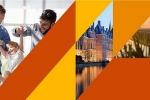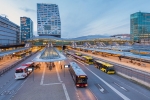Sustainable low-tech solution to a mobility problem
Buurt Mobiel provides transport service for connecting factor in Utrecht District Overvecht
Even when it comes to starting up a social enterprise, customer demand remains the lead. “It’s important to base your thinking on the demand and not because you would like to do something so much”, says Jeroen Blokland, one of the founders of Buurt Mobiel.
Since September 2016, the apple green electric vehicles of Buurt Mobiel have been travelling through the Utrecht district of Overvecht to transport people (often seniors) rapidly to and from shops or, for instance, a doctor. Buurt Mobiel is a low-threshold initiative that has resulted from a mobility need. Founders Moyra Haaxma and Jeroen Blokland explain their successful idea.


The main topic is connecting
“If you discuss care for the elderly with professionals, the same important themes keep cropping up: meeting others, safety and transport. Consequently, the main topic is always: connecting. In my experience, a lot is said about this aspect, but no one really tackles the themes involved”, says Blokland, who has been working with the elderly for more than twenty years. He currently coordinates volunteers in a residential care centre in Utrecht Overvecht.
Mobility problem among the elderly
Together with Moyra Haaxma, a deployment advisor at a volunteer agency in Utrecht, Blokland identified a clear mobility problem among the elderly in Overvecht. The two decided that it was time to actually do something about it. They adopted their own course of action and set up Stichting Buurt Mobiel.

Cooperation with entrepreneurs
Instead of just working with existing care and welfare organisations, Buurt Mobiel collaborates mainly with entrepreneurs in the district. “This was a deliberate choice, because entrepreneurs take decisions quicker. They are immediately clear as to whether they are interested in a new initiative and whether or not they wish to contribute”, says Blokland. ‘We have entrepreneurs who sell our special strip tickets, we found our business space through a property entrepreneur and there is a garage that carries out minor maintenance on our electric vehicles.”
Community role
The entrepreneurs receive something in return from Buurt Mobiel. ”We ensure that the elderly get out again to visit shops or to go to a concert or some other performance together”, says Haaxma. “Buurt Mobiel is therefore a connecting factor in the district. We contribute to keeping the district alive and maintaining the facilities.” In addition, the Buurt Mobiel volunteer drivers are a listening post for the passengers and they can pass on any problems. ‘In such cases, we engage a GP or a community team. Buurt Mobiel therefore acts as a small safety net and that is an example of our community role.”

Customer demand is leading
“Since Buurt Mobiel was featured on the Dutch national NOS TV news, many people have come forward who also want to organise something”, Blokland explains. “That interest is fantastic, of course, but I should emphasise that it’s important to base your thinking on the demand and not because you would like to do something so much. Needless to say, the demand depends on demographic factors, existing transport and the facilities in a district. That all needs to be investigated carefully before you start. Sometimes, the solution can be found in cooperation between existing parties without you having to set up something new.”
Investigating the needs
Haaxma and Blokland arranged to loan a vehicle from a supplier and visited all the shopping centres in Overvecht on a Saturday as a test case. They investigated the needs by talking to people. This investigation showed that a low-tech solution was the best. “Most of our target group do not have, for instance, a smartphone, so there’s not much point in developing an app”, says Jeroen Blokland. “Clients can reach us by phone and we also guide our drivers by phone. The choice for low-tech was also made with a view to costs. We do, however, register the journeys and our driver planning is also handled digitally.’


Existing transport
In Utrecht, Buurt Mobiel answers a need that is not provided for by existing passenger transport, such as public transport, regional taxis and standard taxis. “Even though short distances are often involved, the elderly often require half a day to travel to and from a doctor using, for instance, a regional taxi. They have to be ready far in advance and the regional taxi often travels through other districts first to pick up other people. Or try getting on a bus with a rollator and a bag full of shopping. I tried it recently and then you realise how difficult it is. And bus stops are being located at an increasing distance from residential areas”, according to Blokland.
Care in a transition period
Blokland also refers to the transition period that care is currently experiencing. “Remote care is increasing, people are having to live at home for longer and you need a higher indication before you can go to a care centre. These were all factors that encouraged us to start this initiative.”


















